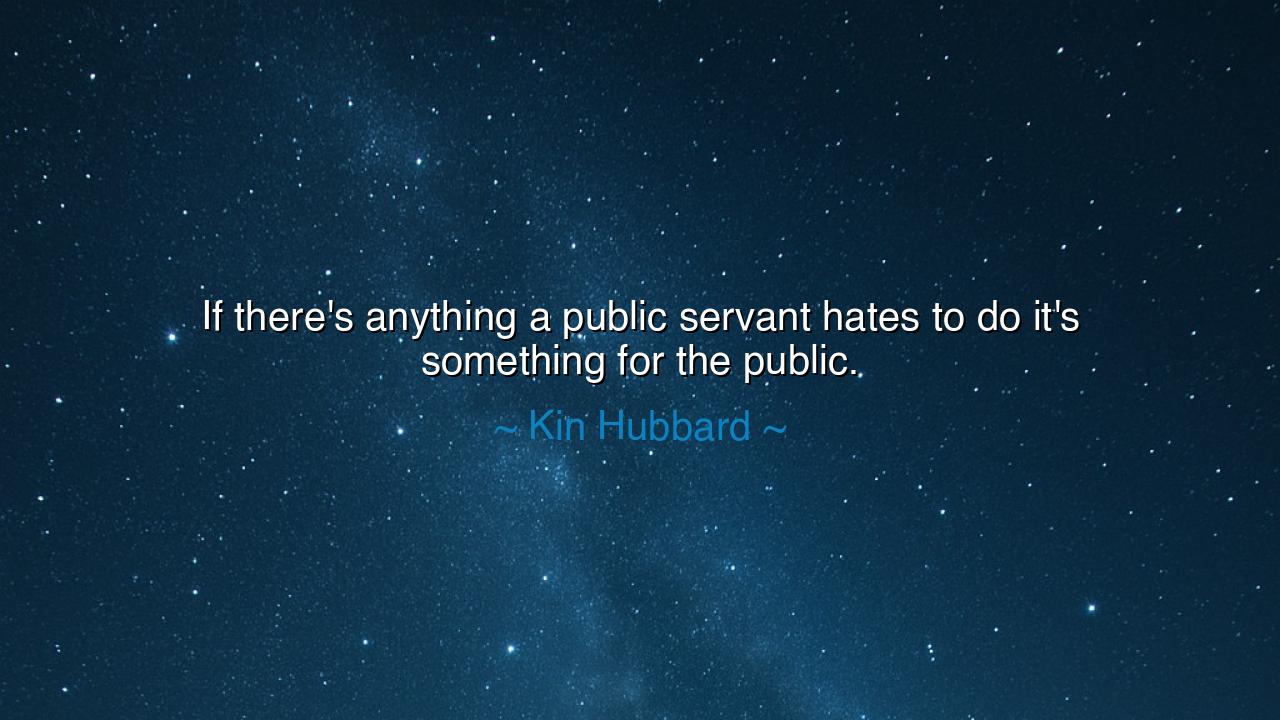
If there's anything a public servant hates to do it's something






In the early years of the American century, when the smoke of industry filled the skies and the humor of the common man was still the sharpest mirror of truth, there lived a wit and observer of human folly named Kin Hubbard. With pen dipped in irony and heart tuned to the rhythms of everyday life, he uttered the words that still echo across the halls of power: “If there’s anything a public servant hates to do it’s something for the public.” Though clothed in jest, his remark bears the weight of wisdom, for it pierces through the velvet of pretense and reveals the ancient flaw of power — that those who rise to serve often forget whom they serve.
The origin of this quote lies in the spirit of humor and satire, yet its roots reach deep into the soil of truth. Hubbard, born in the late nineteenth century, was a cartoonist and philosopher of the people, one who understood that laughter is often the only weapon left to those governed by hypocrisy. His words were not aimed at one politician or one nation, but at the nature of bureaucracy itself — that strange transformation whereby men, once idealistic and eager to help, become ensnared in the webs of formality, pride, and comfort. His was a warning spoken with a smile: beware of the public servant who has forgotten the public.
Indeed, the history of governance, from the temples of Egypt to the parliaments of the modern world, is filled with this irony. The servant becomes the master, the office becomes the end rather than the means, and duty gives way to self-preservation. Consider the tale of Ancient Rome, where the Senate, once a council of wise guardians, grew fat with privilege and corruption. The very men sworn to uphold the Republic spent their days scheming for personal gain while the people they represented languished. The laws they passed bore the people’s name but served the senators’ purse. In time, Rome’s citizens lost faith not only in their leaders but in the very idea of public service, and from this decay rose the tyrants who promised order where virtue had failed.
Hubbard’s quip, then, is more than humor — it is a mirror held to power. He reminds us that when public duty becomes burden rather than honor, society begins to rot from the top down. For the public servant who dreads serving is like a shepherd who fears his flock, a physician who despises his patients. Such a one may hold title and salary, but his spirit is hollow. He performs tasks not out of care, but out of obligation, and the flame of service — that sacred light that once inspired the founders of nations and the builders of cities — flickers and dies.
Yet, let us not despair, for within this cynicism lies a call to renewal. The problem is not that all who serve are corrupt, but that the system of service itself demands constant tending. It is the nature of power to comfort those who wield it, to whisper to them that their station is deserved and their duty optional. Only through humility and vigilance can the servant remain a servant. As the ancients taught, he who governs must first learn to obey; he who would lead must remember the weight of those who follow.
We see, too, in our own time, examples of those who broke this curse — men and women who chose service over comfort. Think of Florence Nightingale, who defied bureaucracy and indifference to heal the wounded in the Crimean War, not for power, but for mercy. Think of Nelson Mandela, who endured twenty-seven years of chains and emerged not bitter, but devoted to reconciliation. These are the rare souls who remembered what Hubbard lamented others forgot — that the purpose of public service is not to rule, but to lift.
The lesson, therefore, is twofold. For those who serve: remember that the title is nothing without the toil. For those who are served: remember to hold your leaders accountable, not with hatred, but with expectation rooted in justice. A public servant should be measured not by words, but by deeds; not by speeches, but by sacrifices. Government, after all, is only as noble as the nobility of the souls within it.
And so, let Kin Hubbard’s humor endure as wisdom. Laugh, yes — but understand the truth behind the jest. For when service becomes burden, and when servants forget their purpose, freedom begins to fade. But when men and women once again take joy in doing something for the public, the nation is reborn in spirit. Remember this always: true service is not an act of labor, but of love. And where love of the people reigns, even the smallest act of duty becomes a sacred offering.






AAdministratorAdministrator
Welcome, honored guests. Please leave a comment, we will respond soon